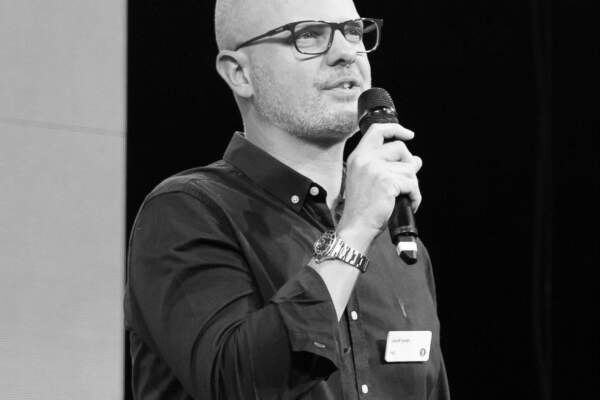Continuing the fourth article of this nine-part series on ethics in the workplace, Luke Andreski asks what it is we bring to the businesses within which we work? Are we merely ‘Work Delivery Units’ or are we something more?
Let’s begin the second part of our analysis of the ethical colleague with a brief thought experiment…
Imagine, for a moment, that there is a part of you which is nothing more than a “Work Delivery Unit” – a WDU.
This is the part of you which fulfils your contract of employment to the letter – or at least to the best of your abilities. It’s the part of you that does the job, nothing more.
Now imagine that this is the only part of you that goes to work.
The picture emerging in my mind when I think of myself in this way isn’t pretty.
It doesn’t have to be.
This is the work-focussed, functional part of me, nothing more. In my mind I’m seeing something like the robot in the first Terminator film: the ‘WDU me’, programmed and unempathic. The rest of me – the parts with the subtlety, the soft edges – is safely locked away at home.
Now imagine what the workplace will be like when you get there, if there is only the WDU you, and only the WDUs of all the other people you work with.
It will be utilitarian. It will be rigidly task-focussed. There will be no laughter or compassion. It will be an empathy-free environment, unwelcoming and cold.
Work Delivery Units… Characterless and functional. As interchangeable as the parts in a machine.
That, at least, is the direction in which this thought experiment takes me. Does your WDU-world look like this too?
Work Delivery Unit – The part of you that delivers work, nothing more |
This thought experiment suggests that the ‘WDU you’ is only a limited part of what you bring to the workplace.
Let’s hazard a list of the more human features that accompany the ‘WDU you’ when you come to work. Whether your workplace is real or virtual, most of this still applies. When you participate in the workplace you bring:
Imagine again a business populated only by Work Delivery Units, without the many other aspects that make us what we are. The inevitable image this conjures up of a cold and utilitarian environment illustrates how significantly the characteristics listed above contribute to the workplace. Take any away and your contribution is powerfully diminished. In fact, I would argue that the ‘WDU you’ is the lesser part of what you bring to the organisation that employs you – and that the more personal characteristics outlined above are the greater part. These traits create the ‘human capital’ available to a company; and the more they are encouraged and allowed to flourish, the more dynamic, robust and successful a business is likely to be.
Work Delivery Units are not enough – The workplace thrives on complex personalities and relationships |
The above argument for the importance of the full ‘self’ to the workplace is largely based on a thought-experiment and common sense. But I’ve a further defence of the ‘full you’ up my sleeve. It comes from the perspectives of Complexity and Systems Theory introduced in Part One of this article.
Systems Theory shows us that all the parts of a ‘complex adaptive system’ are connected with all its other parts, something which to organisations of all kinds. Systems Theory also indicates that the nature of each part of the system contributes to the nature of the system as a whole. This applies to us as colleagues.
The full nature of each of us, as sketched out above, contributes to the nature of the businesses and organisations in which we work. And it is the whole of us which contributes – not just the part of us that does the work and fulfils our contracts of employment. Not just the WDU.
Similarly, Complexity Theory shows us that even our smallest contributions to the workplace can potentially cause dramatic effects, impacting upon the business as a whole. This is the case even with contributions as seemingly trivial as our sense of humour, our consideration for others or our thoughtfulness.
This small-effect=>large-impact phenomenon is not guaranteed. In fact, the structural checks and balances of most organisations work against it. But it is an ineradicable potential, and therefore cannot be ignored.
Thus the total you is important, both in terms of the effect of your personality, presence, morality, humour and creativity cascading outward through the business, and in terms of even your most minor contribution to the workplace having the potential for major impact (the ‘butterfly effect’).
The ‘total you’ is important – Your character, your perspective, your history, your engagement with others, your commitment, your happiness, your sadness – all of you is important in the workplace. |
I’ve described a wide range of characteristics and traits that contribute to what we are. All these aspects interact with each other in the complex subsystem (in relation to the larger workplace system) that each of us represents. And this embedding of systems within systems goes deeper. Each of us as individuals are systems constructed from other systems: the autonomic nervous system; our cardio-vascular system; the musculoskeletal system; our digestive, respiratory, immune and endocrine systems, and our neuropsychological system… to name but a few.
The biological complexity which we represent as individuals is already astounding. Add to this our personalities, our emotions, our sensibilities, our morality, our talents, our knowledge and skill… and each and every one of us is a truly astonishing and wonderful phenomenon.
Many if not all of the great codes of ethics emphasise the miraculous nature of the individual. And from a moral perspective it is essential to recognise this in yourself and therefore, by simple inference, in others. We are each extraordinary. Each of our colleagues, no matter our initial or current emotional or psychological reaction to them, is an astonishing example of complex life. If an alien David Attenborough were watching us, he would describe each of us as fascinating and extraordinary instances of our fascinating and extraordinary species. From this viewpoint – shall we call it the ‘Alien David’ perspective? – we are all equal. We are all equally valuable, equally wonderful and equally worthwhile.
Let’s take this celebration of us a little further. It took 3.8 billion years to make us. We are clearly – and with reasonable objectivity – biological marvels. Each one of us has 37.2 trillion cells (more or less) in our bodies. These cells cooperate. All 37.2 trillion of them. Cooperation is at the heart of being human. We have 100 billion neurons in our brains. Our brains have allowed us to conquer our world. We throw satellites into space. We fly through the air and power through the sea. We sustain huge cities where millions of people cooperate. We engineer genes. We develop medicines which save millions of lives. In his documentary about humanity, Alien David would be ecstatic in his account of us. And his conclusion would be unavoidable: we are extraordinary – both in the mass and as individuals. We are each and every one of us astounding embodiments of life.
The ethical colleague, taking Alien David’s lesson to heart, will strive to see the extraordinary in the people they work with. In their managers, in their peers, in those reporting to them, and in those they struggle to get on with as much as in those they find it easy to like.
The ethical colleague will strive to remember that none of us are just Work Delivery Units. No one is irrelevant. We are all equally deserving of nurture and respect. And the ethical colleague will reflect this consideration in their actions as well as in their words.
My next article concludes our discussion of the ethical colleague by asking which of the building blocks of our personalities are moral and to be encouraged, and which are not. We’ll then finish by considering the key traits of the ethical colleague and how these might impact on career progression and personal success.
Read more articles on our Phase 3 Insights page
About the Author:

Luke Andreski is a writer with over thirty years’ experience in the IT industry, specialising in People Technology implementation projects and change management. More recently he has focused on moral philosophy and psychology, with a particular interest in business leadership and management ethics.
He is currently working in conjunction with Phase 3 on a series of articles investigating Ethics in the Workplace.
